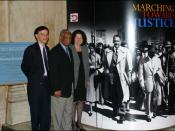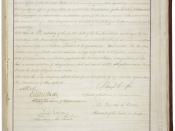Black Codes - Soon every Southern state passed black codes-laws that greatly limited the freedom of African Americans. Black codes reqirerd African Americans to sign work contracts. This arrangement created working conditions similar to those experienced under slavery. In most southern states, any African American who could not proved he or she had a job could be arrested. There punishment might be one year of forced labor with out pay. African Americans were also prevented from owning guns. In addition African Americans were not allowed to rent properties in cities. The black codes alarmed African Americans. African Americans organized to oppose the codes. One group sent a petition to officals in South Carolina. Such calls for equality had little effect on the new state government.
Radical Republicans- wanted the southern states to change much more than they already had before they could return to the union. Like the moderates, they thought the Black codes were cruel and unjust Radicals, however, wanted the federal government to be much more in Reconstruction.
They feared that too many southern leaders were still loyal to the former Confedacy.
Thaddeus Stevens-of Pennsylvania and Charles Sumner of Massachusetts were the leaders of the Radical Republicans. A harsh critic of president Johnson, Stevens was known for his honesty and sharp tongue. He wanted economic and political justice for both African Americans and poor white southerners. Sumner had been a strong opponent of slavery before the civil war. He continued to argue for Americans civil rights which included the right to vote and the right to fair treatment under the law. Both Stevens and Sumner felt that President Johnson's Reconstruction plan was a failure. Although the Radicals did not control Congress, they gained support among moderates when President Johnson ignored criticism of the Black Codes.
Civil Rights Act of 1866 - Republicans responded with the Civil Rights Act of 1866. This act provided African Americans with the same legal rights as white Americans. President Johnson once again used his veto power. He argued that the law would give too much power to the federal government. He also rejected the principle of equal rights for African Americans. The president insisted that they did not understand "the nature and character of our institution." Congress, however, overrode Johnson's veto.
Fourteenth Amendment - To protect civil rights laws from hostile presidents, courts, or future legislators, Republicans proposed a constitutional amendment in the summer of 1866. The Fourteenth Amendment included the following provisions.
1. It defined all people born or naturalized with the United States, except American Indians, as U.S. citizens2. It guaranteed to citizens the equal protection of the laws3. It said that states could not "deprive any person of live, liberty, or property, without due process of law"4. It banned many former Confederate officials from holding state or federal offices.
5. It made state laws subject to review by federal courts6. It gave Congress the power to pass any laws needed to enforce any part of the amendmentPresident Johnson and most Democrats opposed the Fourteenth Amendment. As a result, civil rights for African Americans because a key issue in the 1866 congressional elections. Republican candidates asked Americans to support civil rights by voting for the Republican Party. Johnson traveled around the country defending his Reconstruction plan, but his tour was of little help to Democratic Party candidates.
Reconstruction Acts - In March 1867 Congress passed the first of several Reconstruction Acts. These laws divided the South into five districts, with a U.S. military commander in control of each district. The military would remain in the South until the southern states rejoined the Union. To be readmitted, a state had to write a new state constitution supporting the Fourteenth Amendment. Finally, the state had to give African American men the right to vote. President Johnson disagreed strongly with the Reconstruction Acts. He argued that African Americans did not deserve the same treatment as white people. Republicans knew that Johnson did not support their Reconstruction policies, so they passed a law to limit his power. This law prevented the president from removing cabinet officials without the U.S. Senate's approval. Johnson quickly broke the law by firing Edwin Stanton, the secretary of war. The House of Representatives responded by voting to impeach the president. Impeachment is the process used by a legislature body to bring changes of wrongdoing against a public official. This was the first time in U.S. history that a president had been impeached. The next step, under Article I of the Constitution, was a trial in the Senate. If two-thirds majority of the senators found Johnson guilty, he would be removed from office. Although Johnson was unpopular with Republicans, some of them believed he was being judged unfairly. Others did not trust the president pro tempore of the Senate, Benjamin Wade, who would become president if Johnson were removed from office. By a single vote, Senate Republicans failed to convict Johnson. Even so, the trial broke his power.
Fifteenth Amendment - Congressional Republicans wanted to protect their Reconstruction plan from any major changes. They believed that most African American voters would support Republican policies. In addition, some Radical Republicans argued that it was not fair that many northern states had laws to prevent African Americans from voting. After all, every southern state was now required to grant suffrage to African American men under the Republican plan. These were some of the reasons why Congresproposed the Fifteenth Amendment in 1869. The amendment gave African American men throughout the United States the right to vote. The amendment went into effect in 1870, and it was one of the last important Reconstruction measures passed at the federal level. The Fifteenth Amendment did not please every reformer, however. For example, the act did not guarantee African Americans the right to hold public office. It also did not extend the right to vote to all Americans. This particularly upset women's right activists, many of whom believed it was unfair to grant African American men the vote while still denying suffrage to all American women. Many women's rights activists opposed the amendment for this reason.


